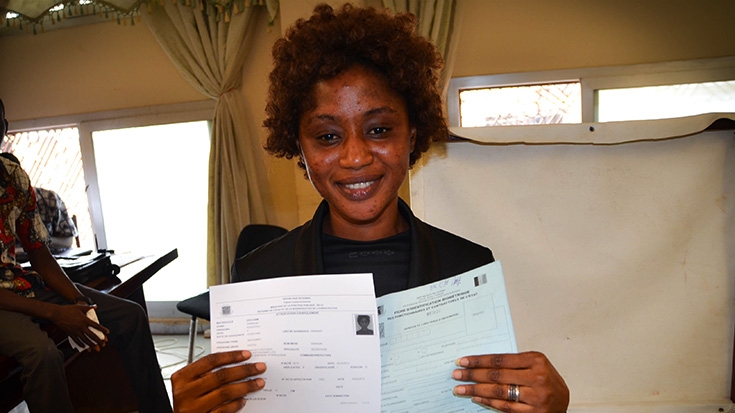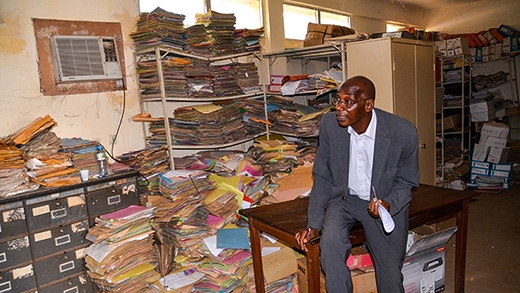The operation generated tremendous interest among Guinean civil servants, who subsequently flocked to enrollment centers following the announcement. Tasked with conducting the operation for the company Inovatec-Gemalto, Paul Assamoi, an Ivorian, recalls the early days of the roll-out: “Initially, all the civil servants wanted to complete the identification process at the same time. There were so many bottlenecks that we had to organize things differently. We decided, with approval from the Ministry of Public Service, to first establish the administrative register for civil servants prior to validation by the administrative inspectors, and then ask the parties involved to begin the enrollment process.”
As the process began to make some headway and produce results, government authorities decided to launch an aggressive communication campaign that publicized the names and faces of those accused of fraud. “We needed to show the Guinean people that we are committed to seeing a transparent and equitable process through to the end. By publicly condemning cases of fraud, we are creating a powerful deterrent,” explained Andre Loua, Secretary General in charge of budget affairs.
What was the extent of the fraud prior to the start of the operation? Officially, some 101,689 salaries were deposited by the payroll division of the Ministry of Budget. By the end of September 2014, the biometric identification operation had revealed that 11,080 civil servants were missing or non-existent, potentially saving the Government of Guinea over 12 billion Guinean francs in one month or approximately 1.7 million dollars. If the government discontinues the payment of unaccounted for salaries, the gain could reach up to 20 million dollars in just one year.
In October 2014, the Guinean Government proceeded to record and freeze the salaries of the unregistered civil servants. In addition, the government was able to identify civil servants earning salaries in both the public and private sectors by cross-checking their data with a register from the National Social Security Fund.
For the first time since the late 1980s, Guinea has reliable figures on its administrative personnel. “Now, whenever we call on our human resources department, we can obtain a civil servant’s file. In the past that wasn’t possible,” acknowledged Eugene Falikou Yomalo, Inspector General of Public Administration. The Inspection Office is one of the offices that will benefit the most from this new reform.
However, these encouraging results do not do away with all suspicion concerning what is commonly referred to as “ghost workers” in the civil service. As is the case with many African administrations, the phenomenon of virtual civil servants, sometimes using names of the deceased, persists as evidenced by the results of recent censuses conducted in Senegal (which saved the country close to 15 billion West African francs), Côte d’Ivoire, Burkina Faso, Cameroon, and Djibouti. Guinea has been able to draw lessons from these various experiences and take advantage of the latest biometric technological advances to improve efficiency and obtain higher rates of success.
“We clearly outlined our requirements and goals for this census, the most important of which was zero tolerance of ‘ghost workers’ by the end of the roll-out. We want Guinea to have a legitimate and credible register,” stated Samba Ba, Senior Economist and Public Sector Specialist at the World Bank. In order to do so, “we used the Automated Fingerprint Identification System (AFIS) for fingerprint comparisons, and the Advanced Business Intelligence Software (ABIS) for facial comparisons to expose those trying to impersonate others. We also convinced the Guinean authorities to simultaneously conduct a census and identify Guinea’s civil servant, which is what distinguishes our project from what was done in Senegal, Benin, Côte d’Ivoire, Gabon, and Burkina Faso,” he added.
“Ghosts workers” remain elusive given the limited resources available to the Guinean administration to conduct proper oversight of its human resources. Rural provinces, which are the areas hardest hit by fraud, will also require special attention to weed out those seeking to illegally benefit from the system. In order to build upon the early success of the reform, the World Bank is assisting the country to modernize its civil service archives which are currently in a deplorable state.
“Since the first reform launched in 1990, only 1,600 new files have been added to the 50,000 files that existed since the country’s independence. Retrieving a single file from the archives can take five days,” lamented Kamara Mohaed Noor, a former employee of the archives department. Throughout the years, copies of administrative actions taken were not systematically filed in the archives.
The World Bank is also providing technical assistance that includes the implementation of three administrative databases: A civil service human resource management system, a budget payroll system, and a recording system of administrative actions carried out by the Government’s general secretariat. While these new initiatives may take some time to be completely functional, one thing is certain: Guinea has achieved one of the most important milestones in the history of its public administration.


